|
|
|
Sort Order |
|
|
|
Items / Page
|
|
|
|
|
|
|
| Srl | Item |
| 1 |
ID:
134496
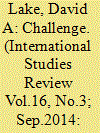

|
|
|
|
|
| Summary/Abstract |
Economic and political power within the international system is becoming more diffuse. Nonetheless, China is today the principal challenger to the United States (Mansfield, this issue). The European Union (EU) remains an economic powerhouse, but is currently plagued by problems centering on the euro and the austerity Germany and the fixed exchange rate regime have imposed on the continent. Europe has also shown little interest in challenging the United States in past decades and, in fact, has been a stalwart supporter of American hegemony for nearly 70 years. Japan remains the world's third largest economy and fourth largest trader, and after decades of stagnation may finally be on the road to economic recovery. Yet, it too remains a supporter of continued American leadership. Brazil, Russia, and India have garnered much attention recently but still rank low on the scale of economic power, whether measured by GDP or trade (Mukherji, this issue). China is the world's second largest economy and largest trader. By any measure, it is the only country likely to overtake the United States in the near future, although its ability to do so is not a foregone conclusion. The distribution of international power may soon return to bipolarity.
|
|
|
|
|
|
|
|
|
|
|
|
|
|
|
|
| 2 |
ID:
136587
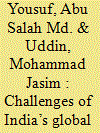

|
|
|
|
|
| Summary/Abstract |
India is emerging as a global economic power and expanding its military capabilities. Its maritime posture in the Indo-Pacific has made it an important stakeholder in the Asia-Pacific strategic ambiguity. The country is invited in almost all global forums and encouraged to play active role in the international affairs. These are some of the key indicators of India’s global emergence. By contrast, India is yet to take strong footholds in several global issues, while negotiating with international powers e.g. the USA and China. Some major challenges of the global emergence of India are its foreign policy predicaments, neighbourhood compulsions and China bogey, compulsions of energy import, limits of its soft power capabilities, internal security threats and domestic underdevelopment. In this context, the two important research questions of this paper are: which factors indicate India as an emerging global power? And, what are the challenges for India’s global emergence? The paper concludes that due to emerging economic and military power, India’s role in the international arena are increasing, but the country faces both internal and external challenges to project itself as a global power.
|
|
|
|
|
|
|
|
|
|
|
|
|
|
|
|
| 3 |
ID:
136438


|
|
|
|
|
| Summary/Abstract |
In 2007, China created the China Investment Corporation (CIC), a sovereign wealth fund (SWF). There is much anxiety about how Beijing will deploy this US$500 billion fund. Specifically, there are concerns that Beijing may use the CIC to sanction others, gain control of other countries’ key assets, or challenge the international order. This analysis demonstrates that China is not wielding its SWF aggressively as an instrument of economic statecraft. Instead, Beijing primarily leverages it in order to advance its domestic objectives. However, China does use the CIC to enhance its natural resource security and build international partnerships.
|
|
|
|
|
|
|
|
|
|
|
|
|
|
|
|
| 4 |
ID:
135317


|
|
|
|
|
| Summary/Abstract |
This paper evaluates the debate over whether China’s emergence as an economic superpower has been a complement or threat to ASEAN by examining data in the eleven years following China’s accession to the WTO. Employing a qualitative approach, it seeks to understand whether China’s growing dominance has hindered ASEAN GDP growth, exports and attractiveness as a destination for FDI. The evidence suggests that China’s rise has caused a shift in global trade patterns, with China dominating Western markets at the expense of ASEAN countries. Despite this, China’s dominance does not appear to have had a significant negative effect on growth rates for ASEAN GDP, exports, or FDI stocks. Given this, the paper concludes that while China is crowding ASEAN out of Western markets, increased Chinese demand for ASEAN imports has more than offset this effect. The result is that ASEAN exports and GDP have grown despite shifting trade patterns in the short run.
|
|
|
|
|
|
|
|
|
|
|
|
|
|
|
|
| 5 |
ID:
134699
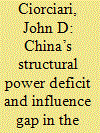

|
|
|
|
|
| Summary/Abstract |
As China rises, its influence on other states’ policy choices will depend partly on the extent of its “structural power.” This article examines China’s role in Asian monetary affairs and argues that deficient structural power has contributed to a significant gap between China’s waxing economic resources and its policy influence.
|
|
|
|
|
|
|
|
|
|
|
|
|
|
|
|
| 6 |
ID:
136702
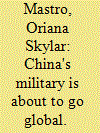

|
|
|
|
|
| Summary/Abstract |
The burgeoning need to protect commercial assets and Chinese nationals abroad will inevitably lead Beijing to develop new military capabilities and take on missions further afield.
|
|
|
|
|
|
|
|
|
|
|
|
|
|
|
|
| 7 |
ID:
136887


|
|
|
|
|
| Summary/Abstract |
It has only been since 2007 that the European Union has had a common space policy. Dependent as any other developed region on space-based assets, Europe has sought a space policy that will ensure that the EU retain a leading role in the strategic policy areas, such as business applications, communications, and weather forecasting. Moreover, in addition to long-standing competition from Russia and the United States, the emerging space actors of China and India, as well as growing economic powers like Brazil, require that the EU reassess its strengths and understands the challenges to implementing a successful pan-European space policy. To address these challenges, for the past seven years the European Space Policy Institute has hosted its Autumn Conference, which brings together space policy scholars from a variety of disciplines to explore those space policy aspects that most affect the European Union. Held on 11e12 September 2013 at ESPI's headquarters in Vienna, Austria, the conference's theme was “Space in a
Changing World.” Hosted by Peter Hulsroj, Director of ESPI, and Herbert Allgeier, Chair of ESPI's Advisory Council, the presentations covered a variety of perspectives, ranging from security, superpower cooperation, international law in space weaponization, and the emergence and impact of new space actors, especially in emerging economic powers.
|
|
|
|
|
|
|
|
|
|
|
|
|
|
|
|
| 8 |
ID:
134235


|
|
|
|
|
| Summary/Abstract |
In the early 1970s in South Africa two developments coincided. Workers in the port city of Durban struck, triggering a union movement which was crucial in defeating apartheid and which remains the society’s largest organized force. And radical scholars began to analyse apartheid as a system of class domination. The two were related, for the scholarship helped convince middle-class radicals to join the union movement. It also made democracy and a critique of private economic power key themes for the movement. The relationship between the ideas and the movement show the limits and possibilities of academic influence on social movements.
|
|
|
|
|
|
|
|
|
|
|
|
|
|
|
|
| 9 |
ID:
136822
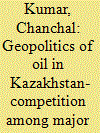

|
|
|
|
|
| Summary/Abstract |
Central Asia has had its fair share of disputes between littoral states since its emergence from the former Soviet Union. Each state has subsequently sought to consolidate power in the region, using these disputes as leverage. Each incident that arises leads to new power struggles and fresh points of dispute between countries on topics such as economics, religion, politics and nationalist ideals. One important geopolitical consequence of the demise of the Soviet Union was the rise of an intense political and commercial competition for control of the vast energy resources of the newly independent and vulnerable states of the Caucasus and Central Asia.
|
|
|
|
|
|
|
|
|
|
|
|
|
|
|
|
| 10 |
ID:
136606


|
|
|
|
|
| Summary/Abstract |
This article examines the central role of the West German state in the transition from the golden to the global age of capitalism in the crisis decade of the 1970s. I argue that in order to keep the world economy open for its exports and shore up its competitive position, German crisis managers pursued a grand economic strategy that sought to defeat the interventionist and expansionary responses of the European left and to commit the United States to monetary discipline. The success of this strategy had contradictory consequences: It stabilized the social consensus inside Germany but undermined it in states whose economies did not stand to benefit from austerity measures. Germany's particularistic way of coping with the crisis thus contributed decisively, though not deliberately, to the “disembedding” of the liberal international economic order. This argument challenges existing explanations of neoliberalism as an Anglo-American imposition on a passive Western Europe and Japan or as an ideological conversion of policymakers. I conclude with an alternative interpretation that highlights the interplay of divergent and opposing strategies of crisis management as the principal driver of social and world order change in the 1970s and potentially today
|
|
|
|
|
|
|
|
|
|
|
|
|
|
|
|
| 11 |
ID:
135217
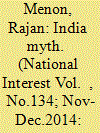

|
|
|
|
|
| Summary/Abstract |
OVER THE last two decades, numerous books, articles and press commentaries have hailed India as the next global power. This flush of enthusiasm results partly from the marked acceleration in India’s economic growth rate following reforms initiated in 1991. India’s gross domestic product (GDP) grew at 6 percent per year for most of the 1990s, 5.5 percent from 1998 to 2002, and soared to nearly 9 percent from 2003 to 2007, before settling at an average of 6.5 percent until 2012.
|
|
|
|
|
|
|
|
|
|
|
|
|
|
|
|
| 12 |
ID:
137125


|
|
|
|
|
| Summary/Abstract |
The changing geopolitics of energy in favour of Asian countries, the crucial dependence of the latter on West Asia for their energy security, and the interest of the USA in sharing the responsibility for regional security, these developments have thrown up new opportunities for Asian countries to pursue shared interests that would bring the USA, other Western powers, and the principal Asian powersChina, Japan, Korea and Indiain a new cooperative paradigm structured around the GCC countries, Iran and Iraq.
The challenges in realizing this strategic paradigm would require the principal regional players to give up their present postures of confrontation and hostility, and engage with erstwhile rivals on the same platform for dialogue, the establishment of confidence building measures, and the addressing of issues that divide them in a free and frank environment.
Before this happens, the four principal Asian countries would themselves have to develop the habit of dialogue as well as the development of consensus amongst themselvesa daunting task in itself since Asian countries have little experience of strategic dialogue with each other on Asian issues.
|
|
|
|
|
|
|
|
|
|
|
|
|
|
|
|
| 13 |
ID:
136671


|
|
|
|
|
| Summary/Abstract |
Development cooperation is an important dimension of international relations, thus has become an integral part of the foreign policy of many countries. Indonesia has always aspired to be a global player, despite of its limitations. As SBY has always shown keen interest in foreign policy, during his tenure, Indonesia embarked on a more serious effort to become an active player in international development cooperation. This arncle discusses the efforts taken by the Government of Indonesia to advance its role in the international development cooperation architecture during the Susilo Bambang Yudhoyono presidency, in particular in the context of development cooperation being carried out as a tool for foreign policy. This article argues that although Indonesia has tended to consider development cooperation as a useful tool of foreign policy, a lot of work is clearly to be done. Development cooperation is not yet closely aligned with the realization of Indonesia’s economic objectives. If a country manages to use development cooperation for both strengthening its soft power (image) and promoting more tangible interests, it can be regarded as pursuing a “smart power” strategy.
|
|
|
|
|
|
|
|
|
|
|
|
|
|
|
|
| 14 |
ID:
134498


|
|
|
|
|
| Summary/Abstract |
The 2013 BRICS summit in Durban, South Africa, attended by the leaders of Brazil, Russia, India, China, and South Africa, produced a joint declaration that simultaneously heralded a new “BRICS Development Bank” and demanded the reform of existing “international financial institutions to make them more representative and to reflect the growing weight of BRICS and other developing countries” (eThekwini Declaration 2013). As they had at previous summits, the BRICS demanded reform of “the prevailing global governance architecture” that was conceived over six decades ago.
|
|
|
|
|
|
|
|
|
|
|
|
|
|
|
|
| 15 |
ID:
136635
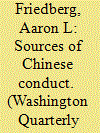

|
|
|
|
|
| Summary/Abstract |
Starting in 2009, an increasing number of foreign observers (and many Chinese as well) began to note a shift towards more forceful or “assertive” behavior on the part of Beijing.1 Among the most frequently cited indications of this trend were:
An internal debate among Chinese elites in which some participants advocated edging away from Deng Xiaoping's “hiding and biding” strategy and replacing it with something bolder and more self-confident;2
A “newly forceful, ‘triumphalist,’ or brash tone in foreign policy pronouncements,”3 including the more open acknowledgement—and even celebration—of China's increasing power and influence;
Stronger reactions, including the threatened use of sanctions and FINANCIAL leverage, to recurrent irritations in U.S.–China relations such as arms sales to Taiwan and presidential visits with the Dalai Lama;
More open and frequent displays of China's growing military capabilities including larger, long-range air and naval exercises, and demonstrating or deploying new weapons systems;
A markedly increased willingness to use threats and displays of force on issues relating to the control of the waters, air space, surface features, and resources off China's coasts. These include ongoing disputes with the Philippines and Vietnam (among others) in the South China Sea, with Japan in the East China Sea, and with the United States regarding its conduct of surveillance and military exercises in areas from the Yellow Sea to the vicinity of Hainan Island.
|
|
|
|
|
|
|
|
|
|
|
|
|
|
|
|
| 16 |
ID:
136888


|
|
|
|
|
| Summary/Abstract |
We are witnessing a fundamental change in the perception of space-related issues. Once a symbol of technological competition between opposing political systems, space activities have become a part of everyday life and an indispensable means for states to achieve economic, scientific, political and social goals. This Report addresses the space activities of Turkey, a latecomer to space challenge but a country rapidly progressing in this field. In this context, major space-related policies and projects are first discussed. The current status of the Turkish space industry is then defined through SWOT analysis (strengths, weaknesses, opportunities, threats). The analysis is informed by a May 2012 workshop was held in Turkey at the Defense Sciences Institute, which brought together a range of interested actors to discuss Turkey's space policy. The workshop was followed up six months later with a survey of a larger group of participants. This Report lays out the findings of these two events, articulating the strengths and weaknesses for Turkey's space aspirations, and also a proposal for the country's future space ambitions. Strategies and policies that will be supportive in achieving the proposed space vision are also introduced.
|
|
|
|
|
|
|
|
|
|
|
|
|
|
|
|
| 17 |
ID:
134497


|
|
|
|
|
| Summary/Abstract |
Are the BRICs driving a fundamental transformation of the world economy? Journalists, investors, policymakers, and academics alike prognosticate about the global impact of these large emerging economies. One camp deems the rise of the BRICs a challenge to America's hegemonic power, increasing global politico-economic instability as a result. Another camp defends the continuation of the American (and thereby, global) status quo with equal fervor. The BRICs, they argue, are mired in their own domestic challenges, mistrust one another, have little interest in leading global affairs, and have yet to command true followership by the rest of the developing world.
|
|
|
|
|
|
|
|
|
|
|
|
|
|
|
|
| 18 |
ID:
134499
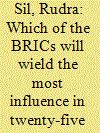

|
|
|
|
|
| Summary/Abstract |
Edward Mansfield (this issue) offers a twofold appraisal of the significance of rising powers—defined here as the BRIC countries—for the study of international political economy (IPE). On the one hand, current approaches in IPE suffice to explain the behavior of rising powers since none threatens the present architecture of the global economy or the positions of the United States and European Union (EU). On the other hand, one rising power, China, has managed to surpass the others in military and economic capabilities, warranting a closer examination of the linkages between political economy and national security. While this view seems eminently reasonable, I argue that forecasting the relative material capabilities of the BRICs over a longer period, say over the next quarter century, requires stretching the boundaries of IPE to pay close attention to incremental changes in demographic patterns and in the geographic distribution of vital resources. Such factors are difficult to capture in the ontologies of conventional IPE theories; yet, over the long run, they may well determine the upper limits for a rising power's capabilities in the global economy. With this in mind, I offer the following tentative proposition: Russia is the BRIC country with the best prospects for boosting both its global economic clout and its population's living standards over the next quarter century.
|
|
|
|
|
|
|
|
|
|
|
|
|
|
|
|
| 19 |
ID:
136720


|
|
|
|
|
| Summary/Abstract |
The dollar, left for dead only a short while ago, is on a roll, and it looks unstoppable for the foreseeable future.
|
|
|
|
|
|
|
|
|
|
|
|
|
|
|
|
|
|
|
|
|